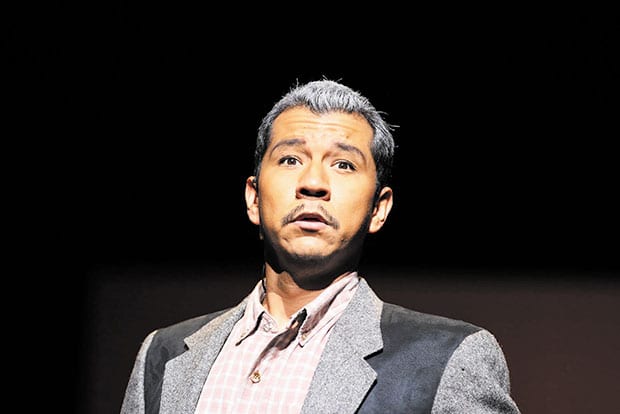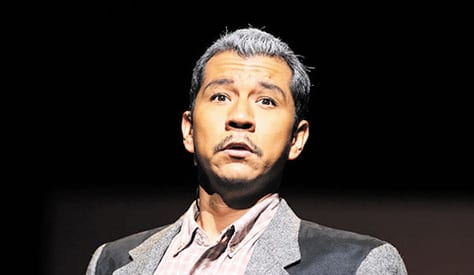Octavio Moreno navigates mariachi opera’s geographical and generational divides

Octavio Moreno, above, plays the younger and older versions of his character to a score played by live mariachis, opposite, in FWO’s ‘Cruzar.’
Opera strikes many as a somewhat haughty affair. The word alone evokes images of impeccably dressed ladies and gents, a full orchestra tuning instruments before house lights dim and costumed divas start belting out arias in a foreign language. And a lot of times, that’s absolutely the case. But the Fort Worth Opera is challenging some of these notions with its production of Cruzar la Cara de la Luna (To Cross the Face of the Moon), a contemporary bilingual opera with an unexpected twist.
“Basically, I think that what makes [Cruzar] different from other operas is that instead of an orchestra, we use a mariachi band,” baritone Octavio Moreno says. By “band,” Moreno means the world-renowned Mariachi Vargas de Tecalitlán, a full mariachi ensemble including guitars, violins, trumpets, a harp and, yes, native costumes. “Aside from that, it’s [still] storytelling by singing.”
 Moreno uses words like “passion” and “home” to describe the emotionally-charged show that addresses squarely (and timely) the topic of immigration. But he also cautions that “it’s tough to use single words to describe it.” In Cruzar, Moreno plays an elderly Texas immigrant with two families — one in the U.S. and one he left behind in Mexico. The character’s dying wish is to reconcile the two. Some of his progeny, of course, are more willing than others to cross the geographical and cultural boundaries. The story, according to Moreno, is not an uncommon one.
Moreno uses words like “passion” and “home” to describe the emotionally-charged show that addresses squarely (and timely) the topic of immigration. But he also cautions that “it’s tough to use single words to describe it.” In Cruzar, Moreno plays an elderly Texas immigrant with two families — one in the U.S. and one he left behind in Mexico. The character’s dying wish is to reconcile the two. Some of his progeny, of course, are more willing than others to cross the geographical and cultural boundaries. The story, according to Moreno, is not an uncommon one.
“My first reaction when we began rehearsing was ‘Oh my God! This would be a good movie!’” Moreno says. “It’s [about] things that happen on a daily basis. You definitely know someone — or you know somebody who knows someone — who has been through this.”
Moreno, a Houston resident, has publicly performed the piece, which the Houston Grand Opera commissioned and premiered in 2010, roughly two dozen times. While most of the productions have taken place in the Southwest, Moreno has performed it as far away as France. Indeed, it was while performing in Paris that Moreno began to understand the broader nature of the opera’s themes. In a riverside café, patrons recognized the Cruzar cast (a moment which Moreno says made him feel like a “rock star”) and began recounting their local immigration stories. The familiar tales were evidence that immigration concerns are not exclusive to the southern border of Texas.
“It’s not only U.S. and Mexico,” Moreno says. “It’s all over the place. People need these stories. Be it a desert or a river or a sea, [there are] many, many unimaginable things people go through just to get a better life.”
For Moreno, the most appealing — and simultaneously, the most challenging — aspect of his role as Laurentino is the opportunity to play the character as a grandfather. It is a stage in life the 35-year-old actor/singer has yet to experience and one he strongly desired to depict convincingly. To prepare himself for the task, Moreno carefully studied photos of his late paternal grandfather. He also spent several afternoons with his maternal grandfather to observe the older man’s walk, speech patterns and movements.
“The young Laurentino is in his teens,” Moreno, who plays Laurentino both past and present, says. “Midlife, he is in his 40s. That is not so complicated [for me]. But being a grandfather is a challenge. It still is every time we do it. I still have to go back to my notes and review that and use a mirror to portray the physicality and the weight of the body and the strength of an old man.”
Moreno recalls a passion for mariachi music since childhood. When he was 5 or 6, his grandfather would ask him to sing a mariachi song each morning before school. Moreno says his fondness for the style of music made him “weird” in his community, where other regional types of music were more popular. In college, Moreno knew he wanted to study music, especially mariachi. The thought of performing opera, however, never crossed his mind.
“I wanted to sing mariachi music in the old-fashioned way and then sing properly,” Moreno says. “That was my goal. Eventually my voice teacher got me [to sing] opera. He was very smart. He used songs he knew I was going to like and that were going to help me develop my vocal technique.”
It seems Moreno, with his strong love for both mariachi and opera, was destined for the role of Laurentino. Oddly, Moreno says he has never considered the convergence of his professional passions in that light. He does, however, consider the role a turning point in his career as a mariachi singer.
“I had quit twice as a mariachi performer,” Moreno says. “[After Cruzar,] I got a few gigs singing only mariachi music. I got to meet the best mariachis of the world. A few of them became very good friends of mine. I made my first mariachi CD with them.”
Though Cruzar lacks gay characters or themes, Moreno feels the opera has the power to touch everyone who sees it, including members of the LGBT community. This, perhaps, is the secret to the show’s success. The subject matter transcends race, religion and sexual orientation.
“Aside from the fact that Laurentino was married, [nothing] in the story has sexual intonation or connotation whatsoever,” Moreno, a straight man who married his high school sweetheart, says. “It doesn’t matter what your beliefs are or what your likes are. The fact is that this immigration problem is with us. It can touch anybody.”
As for the future of immigration policy, Moreno is hopeful.
“Things can happen,” Moreno says. “Things have happened throughout history. Different cultures have been separated by whatever you might [imagine]. Eventually nature or whatever it is comes to a full circle, and everything works the way it is supposed to work.”
For now, however, the struggle continues.
— Scott Huffman
This article appeared in the Dallas Voice print edition April 28, 2017.
















